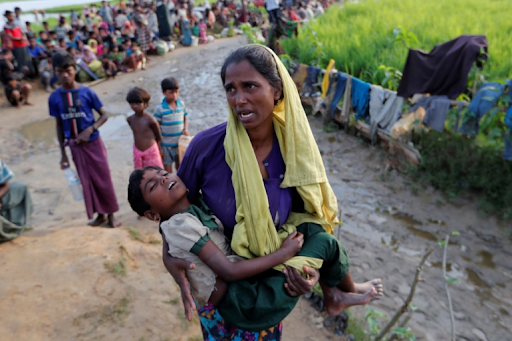Gambia Tells Top UN Court Myanmar Genocide Case is Legitimate
Delegations for Myanmar and Gambia appearing before the ICJ for a public hearing on Feb. 21, 2022. Photo: Frank van Beek/ ICJ
As of Wednesday, lawyers for Gambia continue to push for the International Court of Justice (ICJ) to proceed with its case against Myanmar, rebutting the Burmese military government’s claims to a mistrial. In the wake of the government’s alleged genocide against the Rohingya people, the junta’s representatives objected to the trial on Monday on the basis that the International Court of Justice, the United Nation’s top court, lacked jurisdiction, and that Gambia brought the case on behalf of the Organization of Islamic States.
The case accuses Myanmar of committing genocide during a Myanmar military “clearance campaign” launched in 2017 against the Rohingya people following a Rohingya insurgent group’s attack.
Monday’s ICJ hearing on Myanmar’s case. Photo: ICJ
“This court must reject Myanmar’s meritless preliminary objections and proceed to adjudicate the merits of this dispute,” Gambian Attorney General and Justice Minister Dawda Jallow told the International Court of Justice. He responded to claims that the case is in the name of the Organization of Islamic States saying “this is very much a dispute between the Gambia and Myanmar.”
Myanmar’s grievances with Gambia’s claims are far from the only criticism the trial has faced. The ICJ has been criticized for allowing Ko Ko Hlaing, Burmese minister for international cooperation, and other members of the military government to represent Myanmar on an international scale. Since Gen. Min Aung Hlaing seized power in a military coup in Myanmar last year, the Association of Southeast Asia, United Nations, and several other individual governments have all refused to acknowledge Min Aung Hlaing’s leadership as legitimate. The ICJ case marks one of the first to allow the new government a platform on such a global scale.
“We are glad the case is going forward but find it deeply troubling that the military is allowed to appear before the court as representatives of Burma,” said Kyaw Win, Burma Human Rights Network executive director, in a statement. “The coup regime is in the middle of a horrific campaign of violence against civilians, and the last thing they should be given is any legitimacy in a U.N. body.”
U.S. Judge Joan Donoghue, the ICJ president, allowed the junta’s representatives to serve as the case’s defense under the pretense that they are representing a state, not the government as a whole.
A Rohingya woman carrying her daughter to Bangladesh’s refugee camps after crossing the border from Myanmar on Oct. 17, 2017. Photo: Al Jazeera
Meanwhile, former elected officials of Myanmar have formed a shadow administration called the National Unity Government. Though the government has yet to be acknowledged by any outside powers, its democratically elected officials claim they make up the last legitimate government of Myanmar, and argue that it should represent the country in court.
“It would be a most profound injustice to the Rohingya if the military were to be both their abusers and have any voice in the court,” said the unity government’s foreign minister, Zin Mar Aung.
In addition to killing more than 6,700 Rohingya in the first month of the crackdown, the Myanmar military has also been accused of raping and torturing members of the ethnic group and burning down thousands of homes. Over 700,000 Rohingya have been displaced and fled to Bangladesh and other neighboring countries since the crackdown began.



